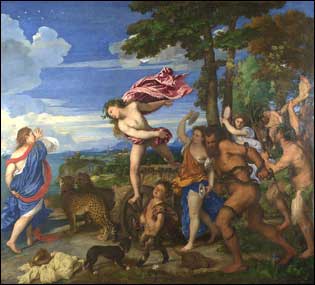|
|
|
|

Titian. Bacchus and Ariadne, 1523-4.
A Ballad on Mr J. H. to Amoret, Asking
Why I Was So Sad
My Amoret, since you must know,
The grief you say my eyes do show:
Survey my heart, where you shall find,
More love than for yourself confined.
And though you chide, you'll pity too,
A passion which even rivals you.
Amyntas on a holy-day
As fine as any lord of May,
Amongst the nymphs and jolly swains,
That feed their flocks upon the plains:
Met in a grove beneath whose shade,
A match of dancing they had made.
His cassock was of green, as trim
As grass upon a river brim;
Untouched or sullied with a spot,
Unpressed by either lamb or goat:
And with the air it loosely played,
With every motion that he made.
His sleeves a-many ribbons ties,
Where one might read love-mysteries:
As if that way he would impart,
To all, the sentiments of his heart,
Whose passions by those colours known,
He with a charming pride would own.
His bonnet with the same was tied,
A silver scrip hung by his side:
His buskins garnished a-la-mode,
Were graced by every step he trod;
Like Pan a majesty he took,
And like Apollo when he spoke.
His hook a wreath of flowers did braid,
The present of some love-sick maid.
Who all the morning had bestowed,
And to her fancy now composed:
Which fresher seemed when near that place,
To whom the giver captive was.
His eyes their best attracts put on,
Designing some should be undone;
For he could at his pleasure move,
The nymphs he liked to fall in love:
Yet so he ordered every glance,
That still they seemed but wounds of chance.
He well could feign an innocence,
And taught his silence eloquence;
Each smile he used, had got the force,
To conquer more than soft discourse:
Which when it served his ends he'd use,
And subtly through a heart infuse.
His wit was such it could control
The resolutions of a soul;
That a religious vow had made,
By love it ne'er would be betrayed:
For when he spoke he well could prove
Their errors who dispute with love.
With all these charms he did address
Himself to every shepherdess:
Until the bagpipes which did play,
Began the business of the day;
And in the taking forth to dance,
The lovely swain became my chance.
To whom much passion he did vow,
And much his eyes and sighs did show;
And both employed with so much art,
I strove in vain to guard my heart;
And ere the night our revels crossed,
I was entirely won and lost.
Let me advise thee, Amoret,
Fly from the baits that he has set
In every grace; which will betray
All beauties that but look that way:
But thou hast charms that will secure
A captive in this conqueror.
|
Behn, Aphra. Oroonoko, and Other Writings. Paul Salzman, ed.
Oxford: Oxford University Press, 1994. 214-216.
 | to Works of Aphra Behn |
Site copyright ©1996-2011 Anniina Jokinen. All Rights Reserved.
Page created by Anniina Jokinen on June 23, 2006. Last updated February 21, 2011.
|
|
|